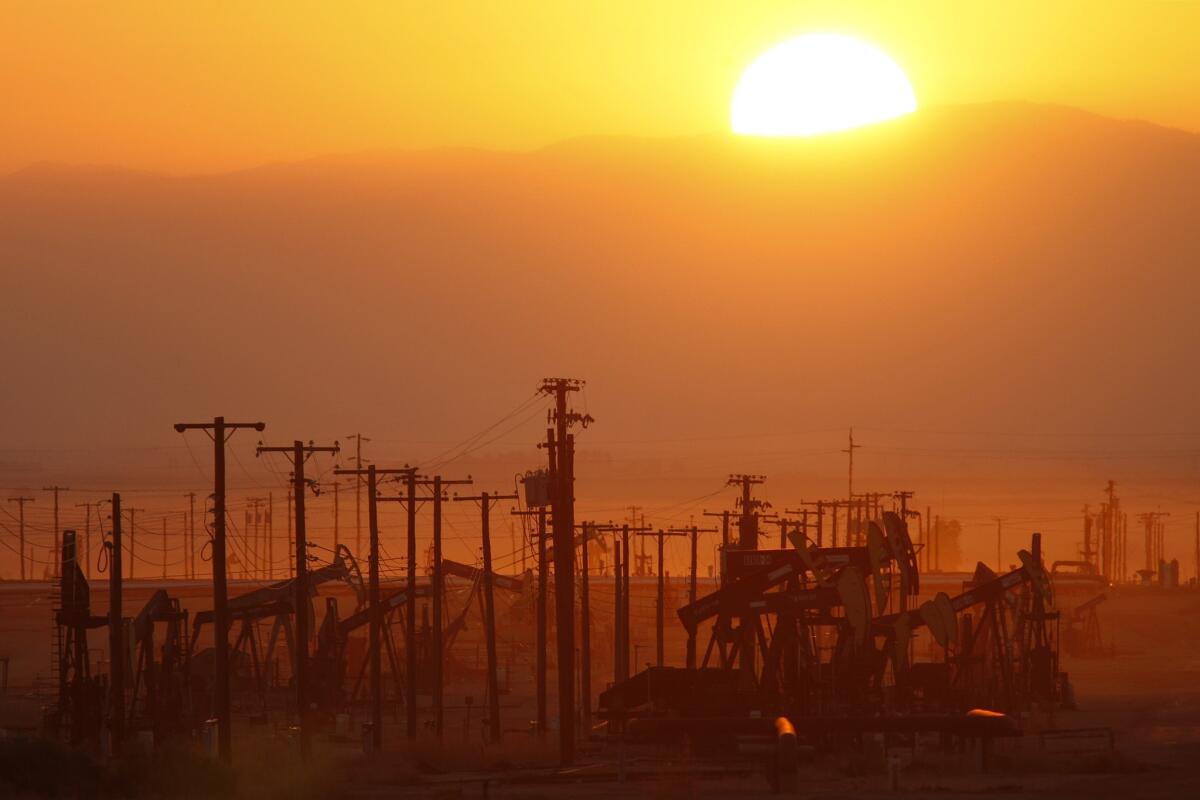Op-Ed: Fracking: Jerry Brown’s environmental blind spot

- Share via
Gov. Jerry Brown may prove to be the greenest government official in American history — emphasis on “may.”
His announcement last week that California would up its target for reducing carbon emissions — to 40% by 2030 — puts him at the head of the pack among governors (admittedly, not a very high bar). His dramatic drive for climate progress has helped catalyze the state’s economy, which in turn will make the reductions easier. Tesla Chief Executive Elon Musk’s announcement that he’s now in the home battery business shows how well this symbiosis is working to grow the state’s economy even as it shrinks its carbon footprint.
But Brown continues to support fracking in the state’s oil patch, and oil production increases. And that’s a problem. It doesn’t matter if everyone in California someday drives a Tesla. That oil will get shipped somewhere, and when it’s burned, it will push global warming yet higher. It’s as if the governor banned smoking in California but turned the Central Valley over to growing tobacco. And given the physics of climate change, secondhand carbon smoke is as damaging as burning it yourself.
That means Brown’s legacy is double-edged: visionary on one side but status quo on the other.
And even worse, fracking in a time of drought is a remarkable obscenity. The process uses a tremendous amount of water. Trucks line up on rural roads in Kern County, not to deliver water to those communities where wells have run dry but to deliver it to drillers who inject it underground. What they bring back up is polluted wastewater.
Apologists for the oil industry argue that it uses less water to frack than agriculture uses to grow food. That may be true, but when you eat an almond, you are not making the drought worse. And the water used in fracking is bringing up more of the oil that is raising the Earth’s temperature. In a state where many people are limiting their toilet flushes and some are doing without showers, it’s disgusting to waste millions of gallons of water this way.
It’s not as if the oil is creating prosperity for most of the people in Kern County, either. As activist and former state Sen. Tom Hayden recently cited, it’s among the poorest parts of the state, with 22% of the population living below the poverty line, 69% of them within a mile of an oil well. The region has one of the highest cancer rates in the country, according to one community hospital.
Across the nation, other governors have stood up to the oil and gas industry and decided their states were better off without fracking. New York Gov. Andrew Cuomo has never been accused of being visionary, but he stood up to the fossil fuel companies and banned fracking last year, heeding scientists’ warnings about air and water pollution.
Jerry Brown was for solar power before most people in the country knew what it was. He can cite chapter and verse about carbon and its effect on the planet. He has been noble in his efforts to help alert the world, long before Al Gore or any of the rest of us.
But his willingness to let oil companies have their way on fracking is a serious blind spot. Given the severity of the drought, Brown has all the room he needs to say no more fracking. Let’s hope he does — for the sake of the atmosphere, the people of Kern County and what should be an unblemished legacy.
Bill McKibben is founder of 350.org, the global grass-roots climate change campaign, and a professor of environmental studies at Middlebury College in Vermont.
Follow the Opinion section on Twitter @latimesopinion and Facebook
More to Read
A cure for the common opinion
Get thought-provoking perspectives with our weekly newsletter.
You may occasionally receive promotional content from the Los Angeles Times.










